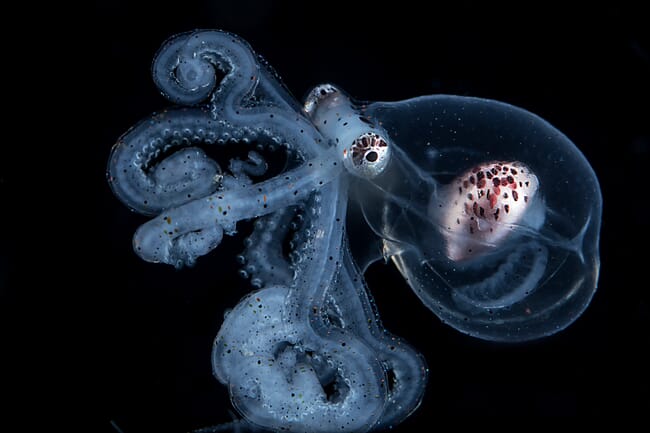
These animals will form the broodstock for the new farm should it go ahead
Eurogroup for Animals uncovered the plans, which had been submitted to the General Directorate of Fishing of the Government of the Canary Islands. Alongside Compassion in World Farming, they have since flagged up their concerns over “the animal cruelty and environmental consequences it would cause”.
The organisations are also calling on the EU “not to use public funds to support octopus farming developments, or any other new industrial animal-based farming in the light of significant and growing scientific evidence that it is killing our planet”.
Nueva Pescanova aims to harvest 3,000 tonnes of octopus each year at the proposed €50 million farm, which is set to be developed in the Port of Las Palmas. The company argues that industrial farming of octopus could help to relieve the growing pressure on wild octopus stocks, with capture fisheries currently landing around 350,000 tonnes a year – 10 times higher than in 1950.
As the first company to successfully close the breeding cycle of the common octopus in captivity, Nueva Pescanova are now growing their fifth generation of the animals at their research centre in Galicia, which The Fish Site visited last year. In the process they argue that they are successfully domesticating the animals, adapting them to farming conditions and reducing many of the issues that have plagued other pioneering attempts to cultivate the cephalopods. They expect mortality levels to be broadly in line with other commonly farmed aquaculture species - at around 10-15 percent.
Animal welfare concerns
However, the animal welfare groups' objections include the proposal to use ice slurry to slaughter the animals, the diminutive size of the tanks and the fact that octopuses are likely to be given feed with a high fishmeal and fish oil content. Their concerns are outlined in a new report called Uncovering the horrific reality of octopus farming.
As Elena Lara, research manager at Compassion in World Farming and author of the report, said in a press release: “We implore the Canary Islands authorities to reject Nueva Pescanova’s plans and we urge the EU to ban octopus farming as part of its current legislative review. It will inflict unnecessary suffering on these intelligent, sentient and fascinating creatures, which need to explore and engage with the environment as part of their natural behaviour. Their carnivorous diets require huge quantities of animal protein to sustain, contributing to overfishing at a time when fish stocks are already under immense pressure.”
Reineke Hameleers, CEO of Eurogroup for Animals, added: “Blindly establishing a new farming system without consideration of the ethical and environmental implications is a step in all the wrong directions and flies in the face of the EU’s plans for a sustainable food transformation.”




